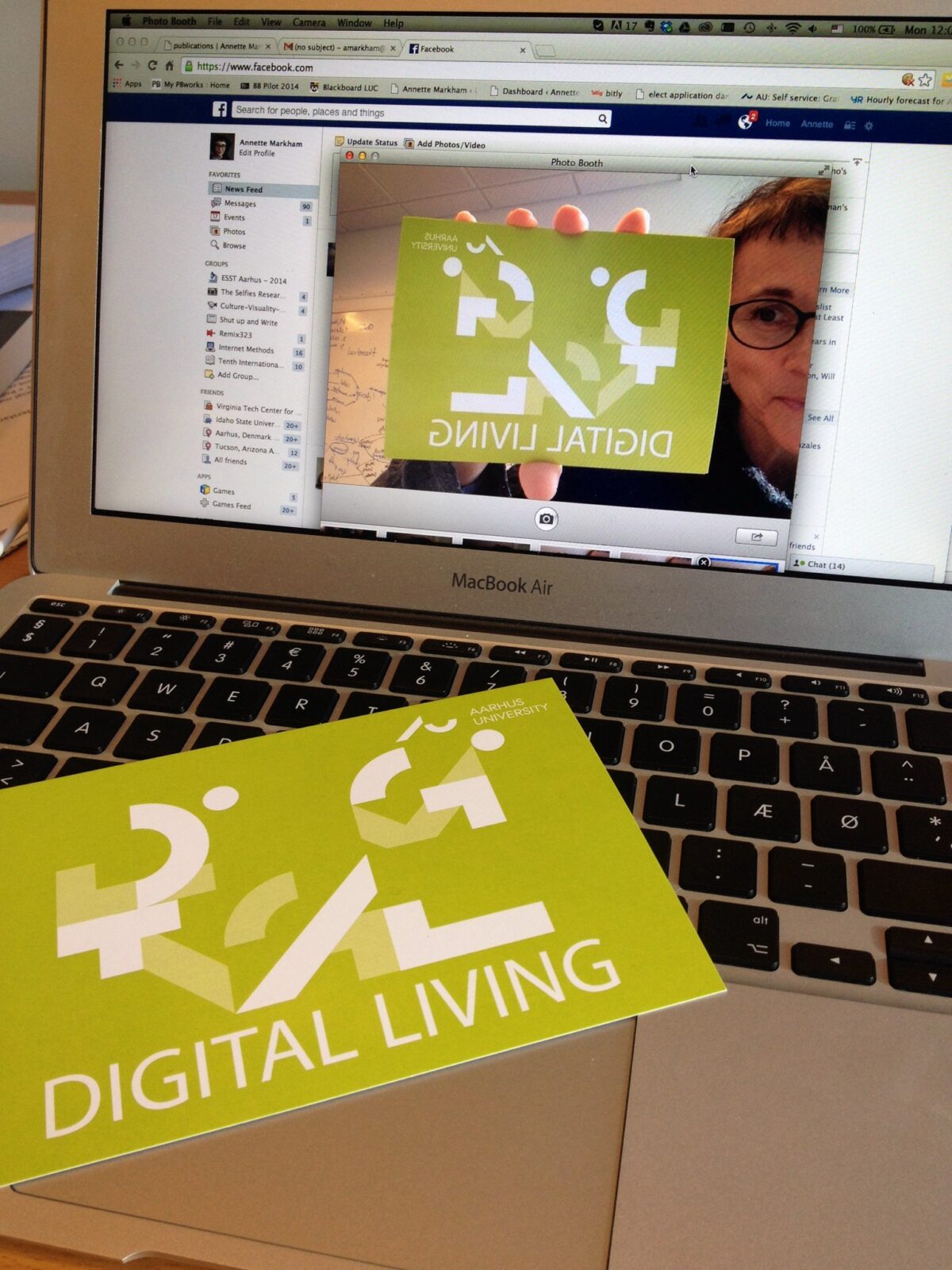Digital Living Summer School: 2014 in Aarhus
Annette Markham
[addtoany]
Our first annual summer school will be held August 11-22, 2014, in Aarhus, Denmark. A lineup of fantastic international scholars will give lectures, facilitate workshops, and engage in creative making with students.
Confirmed faculty participants:
John Carter McKnight, Dept of Sociology, Lancaster University, UK
Ann Light, Dept of Participatory Design, Northumbria University, UK
Jannek Sommer, Dept of Marketing, Globalization, & Culture, Southern Denmark University
Line Hassall Thomsen, Dept of Media Studies, Aarhus University
Claus Bossen, Dept of Information Studies, Aarhus University
Annette Markham, Dept of Information Studies, Aarhus University
in 2014, the summer school is targeted to students at the BA level. Want to see this at the MA and PhD level? Contact us if you’re interested in a summer school in 2015 and 2016.
Digital Living 2014: Focus on Identity & Complexity
Attitudes about social media and the forms of social life that emerge with them range from enthusiastic to suspicious. On the one hand, our connections to technologies benefit us in many ways; we can experiment with different identities, new social communities. We have access to more information than ever before, which allows us to acquire more in-depth knowledge, if we seek it out. We can use web 2.0 technologies to facilitate social movements. On the other hand, the “always on” state of the mobile internet (smart phones, e.g.) plus the rise of social networking sites (Facebook and Twitter, e.g.) prompts many critiques. Are we better off? What happens when our everyday activities via the internet are under surveillance? How do the algorithms influence what we are exposed to? Are “smart” devices always a smart choice?
The summer school will take up these questions and issues.
Required Texts:
- Jose van Dijck (2013). Culture of connectivity: A critical history of social media. Cambridge, UK: Oxford University Press
- Nancy K. Baym (2010). Personal connections in the digital age. Cambridge, UK: Polity Press
- Howard Rheingold (2014). Net smart: How to thrive online. Cambridge, MA: MIT Press.
- Other required articles, websites, and videos are listed in the schedule of events (please contact us for more details).
Outcomes:
Through successful completion of this summer school, participants should:
- Improve their ability to analyze and evaluate the interweaving of digital media in everyday life, through readings and participation in course activities.
- Understand more of the key issues surrounding digital living and appreciate the complexity of these issues.
- Practice some of tools used to create, experience, and analyze digital living experiences, through analytical exercises and class projects.
- Comprehend the fundamental vocabularies of social digital media researchers, through reading, lectures, and discussions.
Topics:
The course is divided into five sub-themes. In each, course participants will discuss key issues, concepts, and concerns. Discussions will be augmented by experiments, workshops, and fieldtrips. We will address cutting edge questions. Since there are no universally agreed upon answers to these questions, participants will not gain answers, but will gain a range of perspectives about how to continue to address these issues after they leave the course.
- Identity/Relationships: What does the concept of identity mean in the digital age? Do we have a single identity? Or do we cycle though various personalities in our everyday lives? How do contemporary enactments of identity influence personal and professional relationships?
- Privacy/Surveillance: Is privacy disappearing or are we reconfiguring the concept to suit the way we think about our actions in increasingly public digital spheres? How does surveillance fit into this discussion, whether it’s from outside forces or inside motivations (self-surveillance, self-quantification)
- Gamification: How does the concept “gamification” play into our current understandings of information and connectivity in modern discourses? What impact does this have on how we think about ourselves in relation to our devices and the spaces/places around us?
- Smart Organizations, Smart Cities: How has the internet shifted our understanding of business and enterprise? How do concepts of production and consumption shifted in networked culture (playbor, prosumer, produsage)? How have relationships and workplaces or worktimes changed? How does this coincide or differ from our ideas about “smart” technologies (e.g. “smart cities?”)
- Remix(ing) culture: How do current practices of sharing and collaboration provide the potential for new cultural formations? How does the concept and practice of remix challenge current legal and ethical considerations of copyright, piracy, and intellectual property?
Activities
Two intensive weeks of hands on thinking will help participants consider particular concerns and debate about important issues of life in the 21st Century. We have invited experts to help us think about these issues in creative ways. Participants might build the concept for a game; use social media to mobilize a small “social movement” in the form of a flash mob; explore the city of Aarhus, searching for stuff we might define as elements of a “smart city,” and build a team remix to explore the potential of remix as political action.
Tentative schedule of events: dlss2014schedule
For other details, contact the facilitators:
Annette Markham: amarkham [at] dac [dot] au [dot] dk
Claus Bossen: imvcb [at] dac [dot] au [dot] dk
